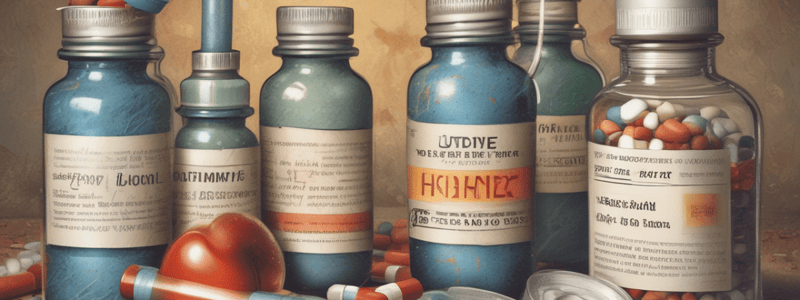Podcast
Questions and Answers
What is a characteristic of prescription drugs?
What is a characteristic of prescription drugs?
- They have a proven therapeutic effect and are considered safe when used as directed. (correct)
- They are available over-the-counter without a prescription.
- They are used for non-medical purposes, often for their psychoactive effects.
- They are illegal and have no medical use.
What is the study of the effects of drugs on the body?
What is the study of the effects of drugs on the body?
- Pharmacodynamics
- Pharmacokinetics
- Toxicology
- Pharmacology (correct)
What is a warning sign of substance abuse?
What is a warning sign of substance abuse?
- Decreased tolerance
- Loss of control over drug use (correct)
- Increased energy
- Improved cognitive function
What is a risk associated with recreational drug use?
What is a risk associated with recreational drug use?
What is the term for the effect of one drug on the action of another drug?
What is the term for the effect of one drug on the action of another drug?
Flashcards are hidden until you start studying
Study Notes
Prescription Drugs
- Definition: Legally available drugs that are prescribed by a licensed medical professional to treat a specific medical condition.
- Characteristics:
- Require a prescription from a doctor or other authorized healthcare provider.
- Typically have a proven therapeutic effect and are considered safe when used as directed.
- Examples: antibiotics, antidepressants, painkillers, and blood pressure medications.
Pharmacology
- Definition: The study of the effects of drugs on the body.
- Branches:
- Pharmacokinetics: Study of the absorption, distribution, metabolism, and excretion of drugs.
- Pharmacodynamics: Study of the effects of drugs on the body, including their mechanism of action and therapeutic effects.
- Key concepts:
- Bioavailability: The extent to which a drug is absorbed and becomes available in the body.
- Half-life: The time it takes for the concentration of a drug in the body to decrease by half.
Substance Abuse
- Definition: The use of a drug in a manner that is harmful to the individual or others.
- Types of substance abuse:
- Dependence: Physical or psychological need for a drug.
- Addiction: Compulsive drug use despite negative consequences.
- Misuse: Using a drug for a purpose other than its intended medical use.
- Warning signs:
- Increased tolerance
- Withdrawal symptoms when use is stopped
- Loss of control over drug use
- Neglect of responsibilities and relationships
Recreational Drugs
- Definition: Drugs used for non-medical purposes, often for their psychoactive effects.
- Examples:
- Illicit drugs: Cocaine, heroin, marijuana, and methamphetamine.
- Legal drugs: Alcohol, nicotine, and caffeine.
- Risks:
- Addiction
- Impaired judgment and decision-making
- Increased risk of accidents and injuries
- Legal consequences
Drug Interactions
- Definition: The effect of one drug on the action of another drug.
- Types of interactions:
- Synergistic: The effect of two drugs is greater than the sum of their individual effects.
- Antagonistic: The effect of one drug is reduced or blocked by another drug.
- Additive: The effect of two drugs is equal to the sum of their individual effects.
- Factors that influence drug interactions:
- Pharmacokinetics
- Pharmacodynamics
- Patient factors (e.g. age, weight, liver function)
- Drug characteristics (e.g. dosage, frequency of administration)
Let me know if you need any translation
Studying That Suits You
Use AI to generate personalized quizzes and flashcards to suit your learning preferences.




